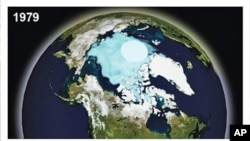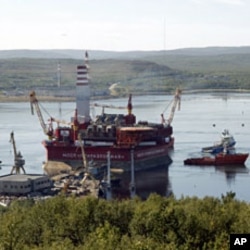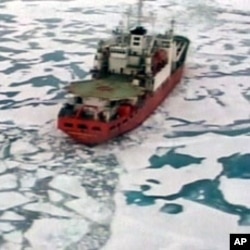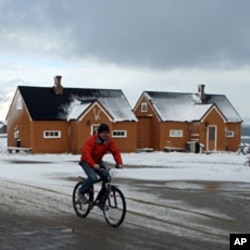China has been active in Antarctic exploration and scientific research since 1984, but only recently signaled its intent to become a hands-on player in Arctic affairs. As Beijing implements an unusually ambitious shift toward the poles, its goals and motivations are drawing scrutiny.
Antarctica’s pristine environment is currently protected by the Madrid Protocol, a 1991 pact negotiated by then-Australian Prime Minister Bob Hawke and his French counterpart.
The pioneering international agreement bans the exploitation of the southern polar region’s natural resources including coal, metals, and oil fields potentially as large as Saudi Arabia’s.
Marking the protocol’s 20th anniversary, former prime minister Hawke says he hopes its terms will be upheld beyond the agreement’s expiration, in 2048.
“It’s very important, fundamentally because Antarctica remains the only environment left in the world where scientific research can go on unimpeded by any form of pollution," said Hawke.
But, in this era of energy insecurity and improved extraction technologies, the moratorium on the exploitation of Antarctica’s natural resources looks increasingly susceptible to challenge.
Anne-Marie Brady, a political scientist at Christchurch University, is pessimistic that the ban on mineral exploitation in Antarctica will survive beyond 2048.
“The global economy is so dominated by the need for oil. Unless there was a major shift in how people live their lives, particularly in developing countries, I think we’re just going to go on and on trying to find new locations to exploit oil," said Brady.
Several nations are already believed to have undertaken feasibility studies for oil extraction in Antarctica. Concerns about China’s intentions grew last year when the land and resources minister, Xu Shaoshi, visited his country’s Zhongshan Antarctic base.
Rebecca Lee of the Hong Kong Polar Museum Foundation says China’s polar interests are more about national prestige and scientific research, not territorial gain or mineral wealth.
“Weather change can impact our life, our future, our agriculture, our economy. So we need to understand; not [take], not occupy,” Lee said.
But while China appears content to preserve the status quo in Antarctica, it has had only mixed success reassuring skeptics about its plans in the Arctic.
Beijing’s effort to achieve permanent observer status on the Arctic Council - a governing forum constituted by the eight Arctic states including the United States, Canada, Russia and Scandinavian countries - has twice been rejected.
Anne-Marie Brady says that Beijing is signaling it has legitimate interests in the northern polar region. She believes this represents a move away from China’s usual non-confrontational approach to international relations.
“In the Arctic, they want to have a leadership role in future decision making. And, this is actually a big shift in Chinese foreign policy. With this, they’ve actually stuck their oar in,” Brady added.
China’s interest in the northern polar region partly derives from the changes global warming could have on northern sea routes. As Arctic ice melts, sea lanes in the previously un-navigable Northwest and Northeast passages could potentially be ice-free within a decade.
The potential to sail these new routes, controlled by Canada, Russia and the U.S., is both an economic and security issue for China.
Its merchant shipping fleet, delivering exports from Shanghai and Hong Kong to markets in Europe and North America, could cut 6,500 kilometers off voyages usually undertaken via the Suez Canal. The pirate-infested Gulf of Aden would be avoided altogether.
Cheng Baozhi, an assistant research fellow at the Shanghai Institute for International Studies, argues that non-Arctic states cannot be users of Arctic shipping routes without having a role in the region’s decision-making processes.
“Cooperation is the trend. [But] military conflict, we cannot say it is impossible. Although they have no direct territorial link, the Arctic has [an] impact for the social and economic development [of] states in the Northern Hemisphere: China, Japan, Korea,” said Cheng.
The melting ice raises worries that Chinese interests are moving to invest in, and extract, the Arctic’s considerable natural resources.
Beijing’s relations with Norway highlight the importance China attaches to such strategic procurement. Disgruntled at Norway for awarding the 2010 Nobel Peace Prize to Liu Xiaobo, Beijing has frozen political and trade ties with Oslo for a year.
Yet it has ensured this freeze does not extend to preventing state-owned enterprises from investing in Norwegian-based energy concerns like silicone and solar panel producer, Orkla.
In Iceland, Chinese tycoon and reputed former propaganda minister Huang Nubo continues to worry locals with his bid to buy 300 square kilometers of farmland. He says he plans to build a resort on the plot of land, which comprises just under half a percent of the country’ total landmass.
Birgir Armannsson, a member of Iceland’s parliament, observes that, although Reykjavik enjoys good relations with China and there are no reasons to doubt Huang’s integrity, he is nonetheless a polarizing figure.
“In times of [financial] crisis, there are all kinds of buccaneers," said Armannsson. "I ask myself, why is this person so interested in buying a lot of not so good farming land ... There are possibilities for hydropower, possibly geothermal power, but we don’t have the whole picture.”
China’s efforts to expand its presence in the Arctic comes as other countries, including the United States, struggle to fund expeditions and infrastructure in the costly polar environment.
Both U.S. polar icebreakers have been out of service for some time, forcing researchers to lease vessels from other countries for the annual mission to resupply the McMurdo research station in Antarctica.
Meanwhile China plans to increase its polar activities aided by a new icebreaker expected in 2013. The sister ship to the Snow Dragon will give Beijing the capacity to permanently deploy a vessel in Arctic waters.



